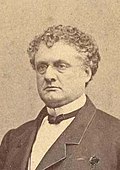| |||||||||||||||||
| |||||||||||||||||
 County results Andrew: 50–60% 60–70% 70–80% 80–90% >90% | |||||||||||||||||
| |||||||||||||||||
The 1863 Massachusetts gubernatorial election was held on November 3. Governor John Albion Andrew was re-elected to a fourth term in office over Democrat Henry W. Paine.
| |||||||||||||||||
| |||||||||||||||||
 County results Andrew: 50–60% 60–70% 70–80% 80–90% >90% | |||||||||||||||||
| |||||||||||||||||
The 1863 Massachusetts gubernatorial election was held on November 3. Governor John Albion Andrew was re-elected to a fourth term in office over Democrat Henry W. Paine.
| Party | Candidate | Votes | % | ±% | |
|---|---|---|---|---|---|
| Republican | John Albion Andrew (incumbent) | 70,483 | 70.70 | ||
| Democratic | Henry W. Paine | 29,207 | 29.30 | ||
| Total votes | 99,690 | 100.00 | |||
| Republican hold | Swing | ||||
State elections in Massachusetts | |
|---|---|
| General | |
| Governor |
|
| Mass. Senate | |
| Mass. House | |
| Gov.'s Council | |
"s/" = Special election For federal elections, see Template:Federal elections in Massachusetts footer. | |
| U.S. Senate | |
|---|---|
| U.S. House | |
| State governors | |
| State judicial | |
| Mayors | |
| Participants |
| ||||||||||||||||||||||||||||||||||
|---|---|---|---|---|---|---|---|---|---|---|---|---|---|---|---|---|---|---|---|---|---|---|---|---|---|---|---|---|---|---|---|---|---|---|---|
| Elections |
| ||||||||||||||||||||||||||||||||||
| Key events |
| ||||||||||||||||||||||||||||||||||
| Aspects |
| ||||||||||||||||||||||||||||||||||
| | This Massachusetts elections–related article is a stub. You can help Wikipedia by expanding it. |


